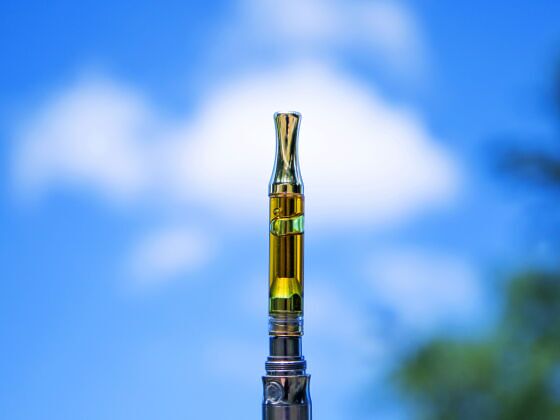Travel can cause a great deal of stress and heightened anxiety for many travelers. For some, cannabis — whether it contains THC or only the non-psychoactive CBD — is one way to help stay calm. With more people traveling to parts of the United States where they can freely and legally indulge in THC or CBD edibles, vapes, and more, it makes sense that there have also been more people traveling with the substances overall.

Everything You Need to Know Before Traveling With CBD and THC, at Home or Abroad
However, the recent news of WNBA star Brittney Griner’s detainment in Russia for allegedly traveling with a vape cartridge containing THC raising some questions: Where can you travel with substances that were purchased legally, and what’s considered “drug” trafficking?
The definition of drug trafficking includes simply traveling with a substance that is considered a drug, even if there was no intent to sell, distribute, or use the substance.
To put things simply, you cannot legally fly with any product that contains THC inside the US or leaving from the US. This is true even in states with recreational cannabis laws, since airports are under federal jurisdiction and THC is illegal on the federal level. There are specific laws that vary state-by-state when it comes to driving with cannabis in legal recreational states (just don’t drive up to the Mexican or Canadian border with the drugs).
Things are more complicated when it comes to CBD. Here’s what the laws state around the world:
Domestic US Flights
According to TSA guidelines, for domestic flights, you can carry and travel with FDA-approved CBD products that contain less than 0.3 percent THC. The TSA’s site states: “Marijuana and certain cannabis-infused products, including some Cannabidiol (CBD) oil, remain illegal under federal law except for products that contain no more than 0.3 percent THC on a dry weight basis or that are approved by FDA.”
Products that fit the guidelines can be carried in your checked baggage or carry-on.
Crossing state lines
When taking a road trip or crossing from one state to another, it’s important to recognize that each state, city, and county, have their own sets of laws. According to Forbes, traveling across state lines with CBD is legal. However, products have to fall under the 2018 Farm Bill that puts strict guidelines on CBD from hemp that’s legal on a federal level:
- The THC percentage can be no more than 0.3% (If it exceeds that percentage it can be considered marijuana, by law, which can land you in federal trouble.)
- The product must be produced under the 2018 Farm Bill
- The United States Department of Agriculture (USDA) has to have issued approved regulations and procedures within that specific state
CBD allowance by country
Australia: CBD oil is legal but highly regulated and restricted. Opt for purchasing CBD in Australia as opposed to traveling with it.
Brazil: According to Brazilian Federal Law, it is permissible to use cannabis-based medicines. This means that you must possess a Brazilian medical prescription.
Costa Rica: The general consensus is that Americans can travel to Costa Rica with CBD products that contain less than 0.3 percent THC.
Germany: Local law dictates that CBD products cannot contain more than 0.2 percent THC, but if you’re traveling with a higher percentage, it’s punishable by a fine or jail time.
India: Many tourists travel to India with their own CBD, but it’s also possible to purchase it there.
Mexico: CBD is permitted across the USA-Mexico border, but the label has to state that it is hemp-derived. CBD is legal in Mexico as long as the product contains less than 0.1 percent THC.
The Netherlands: Travelers can carry products with less than 0.05 percent THC (yes, cannabis is technically illegal in the Netherlands just like most European countries).
Thailand: FDA Thailand has to give you special medical permission to travel there with a CBD supply of no more than 30-days.
United Kingdom: The product cannot contain any THC and must be a product that is designed for human consumption (food-grade).
Where’s CBD prohibited?
There are very few countries in Asia that are CBD-friendly, so it’s important to research your travels with cannabis oil based on the destination. Traveling with your CBD to Japan, Singapore, and Russia could land you with an astronomically high fine or thrown in prison. And although China has been known for a bustling CBD industry, using, selling, or buying CBD in China is absolutely illegal.
According to the Government of Canada, it is illegal to transport cannabis and products containing cannabis – including edible cannabis, cannabis extracts, and cannabis topicals – across the Canadian border. CBD is also illegal in most African nations with the exception of South Africa.
Visiting a Middle Eastern country with CBD is considered drug trafficking. They have a zero-tolerance policy and in the United Arab Emirates, the presence of CBD in your bloodstream is considered drug possession.